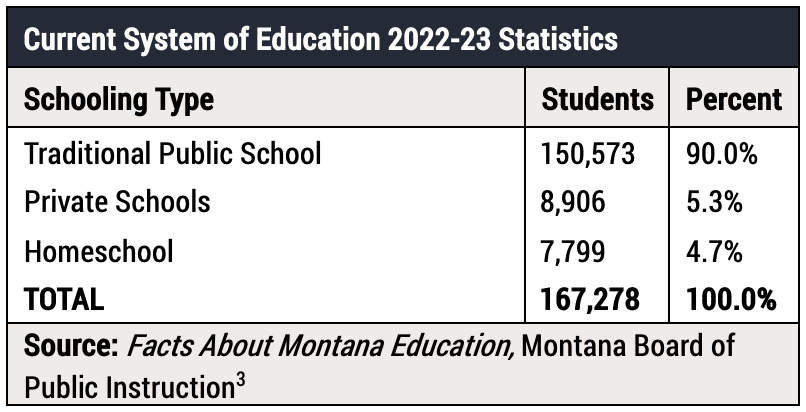The answer to this question is simple – the incentives change to deliver quality and innovation to every student and family.
In the current monopoly state, the primary focus of the education establishment is on complying with prescriptive one-size-fits-all regulations, doing what is contractually required, and perpetuating monopoly power. Regulatory compliance is the bar around our ankles because it works at odds with innovation, entrepreneurship, and adaptation. Nobody gets out of bed in the morning excited to comply with layers of regulations! Education talent is the greatest resource that Montana has to serve children and families, but we are not getting close to maximizing its potential impact under the current monopoly conditions.
In the 2023 legislative session, Montana may have finally seen the beginning of change. To maintain unified control over public schools, the education establishment ran a bill, called House Bill 549, to pass a law that would allow districts to run charter schools. Under that new law, the Montana Board of Public Education recently approved the opening of 19 new charter schools run by 11 local school districts. Just like traditional public schools, these new schools will be owned and operated by local school boards and subject to all federal, state, and district regulations. As such, they are not actually charter schools as Kolderie defined them earlier in this article.
Fortunately, the Montana legislature also passed a second bill into law. That bill, called House Bill 562, allows community groups to apply to the Montana Community Choice Commission to open new public schools. These schools can be organized by independent groups – education entrepreneurs, school management firms, teachers, parents, founding boards of directors, etc. – who apply for a contract to open a new public school. They will be exempt from prescriptive sections of the state public school code, so they are not forced to deliver a one-size-fits-all education.
With the passage of these two bills and others that enable parents to exercise school choice, Montana has a big opportunity on its hands. By embracing education pluralism, Montana can shift the primary focus to exercising visionary entrepreneurship to educate students and serve families in extraordinary and varied ways. The desire to collaborate, innovate, compete, and deliver the best possible offering unleashes human ingenuity and inspires hard work, dynamic growth, and continuous improvement. In a sector of education pluralism, teachers and school leaders get out of bed in the morning to fulfill their vocational calling, form the next generation, and make their communities the best they can be.

